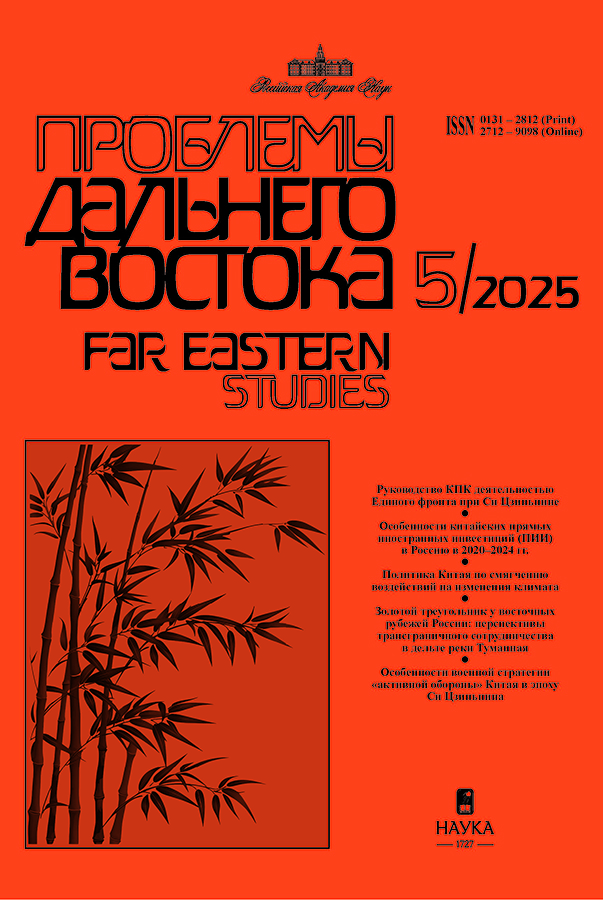Evaluation of the Healthcare System Effectiveness of the Republic of Korea
- Autores: Semina L.I1
-
Afiliações:
- Center for Korean Studies, Institute of China and Contemporary Asia of the Russian Academy of Sciences
- Edição: Nº 5 (2025)
- Páginas: 108-122
- Seção: State and society
- URL: https://genescells.com/0131-2812/article/view/696491
- DOI: https://doi.org/10.31857/S0131281225050072
- ID: 696491
Citar
Texto integral
Resumo
The healthcare economy of the Republic of Korea began to arouse interest after the country showed its ability to cope with the consequences of the coronavirus pandemic, practically without isolating itself, unlike many other countries. The study of the experience of the Republic of Korea is important for understanding whether it is worth reforming one's system according to the model of the Republic of Korea. An important issue is the assessment of the economic efficiency of the South Korean system. At the same time, the system should be equally effective both in a stable period and to withstand pandemic-type crises. To assess economic efficiency, or determine the optimal use of resources, we studied healthcare expenditure during normal and crisis periods. Life expectancy, total mortality rate per thousand population, and infant mortality rate were taken as the results. The paper provides a comparative analysis with data from Japan and Italy. The author concludes that before the pandemic, the healthcare system of the Republic of Korea was relatively economically efficient, and during the pandemic, despite its undeniable successes, it turned out to be less economically efficient than other countries in the study. Rising healthcare costs led to a crisis in the system after the pandemic, which revealed the need to reform the existing system to restore economical optimum.
Sobre autores
L. Semina
Center for Korean Studies, Institute of China and Contemporary Asia of the Russian Academy of Sciences
Email: semina@iccaras.ru
ORCID ID: 0000-0003-4413-3086
Senior researcher Moscow, Russian Federation
Bibliografia
- Всемирный Банк. URL: https://data.worldbank.org/indicator/ (дата обращения: 08.05.2025).
- Зуева А.Г. Влияние пандемии коронавируса COVID-10 на устойчивое развитие экономики Республики Корея // Современные проблемы Корейского полуострова. Материалы XXV конференции корееводов России и стран СНГ. Москва, 2021. С. 195–204 doi: 10.48647/IFFES.2021.70.39.019
- Семина Л.И. Оценка эффективности системы здравоохранения РК в период пандемии // Современные проблемы Корейского полуострова. Сборник статей. Москва, 2022. С. 227–236. doi: 10.48647/IFFES.2022.29.84.024
- Экономика здравоохранения: учеб. пособие / Науч. ред. М.Г. Колосицына, И.М. Шейман, С.В. Шишкин. М.: Изд. дом ГУ ВШЭ, 2008. 479 с.
- Frech III H.E., Miller R.D. Jr. The Productivity of Health Care and Pharmaceuticals: An International Comparison // The AEI Press. Washington D.C., 1999. 108 p.
- Mathieu E., Ritchie H., Ortiz-Ospina E. et al. A global database of COVID-19 vaccinations // OurWorldInData. 2021. URL: https://ourworldindata.org/covid-vaccinations (дата обращения: 13.03.2022).
- Mushkin S.J. Toward a Definition of Health Economics // Public Health Reports. Vol. 73. No. 9. September 1958. Pp. 785–793.
- Palaniappan A., Dave U., Gosine B. Comparing South Korea and Italy's healthcare systems and initiatives to combat COVID-19 // Pan American Journal of Public Health. Rev Panam Salud Publica, 2020. No. 44 (53). doi: 10.26633/RPSP.2020.53
- Worldometers. URL: https://www.worldometers.info/coronavirus/ (дата обращения: 08.03.2022).
- Yang Seungmi, Khang Young-Ho, Harper S., Smith GD., Leon D.A., Lynch J. Understanding the Rapid Increase in Life Expectancy in South Korea // American journal of public health. 2010. № 100 (5). P. 896–903. doi: 10.2105/AJPH.2009.160341
Arquivos suplementares










